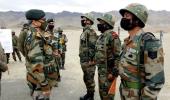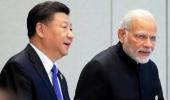'How Xi Jinping will withdraw the aggression and justify it to his Communist party in case of a negotiated settlement might be his biggest headache.'
'Unless he is ready to gamble on an armed conflict, whose outcome given India's battle-readiness and determination is always uncertain,' observes Virendra Kapoor.
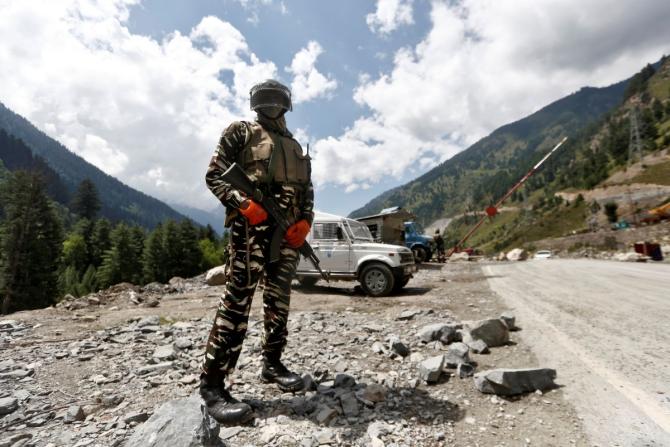
There is no early end in sight to the border standoff.
The diplomatese in the joint statement that emerged after the meeting of the Indian and Chinese foreign ministers in Moscow on Friday, September 11, pushed the issue of the disengagement into the domain of the rival generals.
Military commanders of rival troops now standing eyeball-to-eyeball in a position of tense confrontation at the Ladakh border will meet to discuss the pullback.
As of now, the Chinese show no intention to vacate the aggression.
The PLA generals are livid after India pre-emptively occupied vantage heights on the southern bank of the Pangong Tso lake.
They tried to dislodge the Indian soldiers from those heights, but were foiled.
Since then, they have further fortified their positions, brought in heavy warfare equipment and seem to be digging in their heels for an armed confrontation.
The Indian Army has matched the PLA build-up and appear equally determined to stand their ground.
Without doubt, the Chinese were taken completely by surprise by the Indian determination to confront them frontally not only to prevent further infiltration into Indian territory, but to demand that the PLA vacate the area it had occupied in early April.
That was the clearest notice to China that India served on the night of August 29-30 by occupying those vantage heights which overlook a key PLA garrison and a couple of border posts.
The bold resistance to China is a new for India.
Since the Chinese occupied nearly 40,000 kilometres of Indian territory in the 1962 War, they have periodically encroached on our side of the un-demarcated LAC.
The PLA's salami-slicing tactics was met with little resistance by victim nations.
China practiced this tactic against all its neighbours.
But the 2020 India is different. China may be a bigger economic and military power, but India is capable of defending its territorial integrity and national honour.
India is no pushover, period.
Unfortunately, Prime Minister Modi's domestic critics fail to grasp this new assertiveness in India's relationship with its neighbours.
While Rahul Gandhi can be excused for childishly asking 'what about the land China has occupied', it was surprising to find the former nhational security advisor mockingly remarking, 'If you think banning apps will work, then good luck.'
This was, to say the least, unfair, knowing full well as Shivshankar Menon did about the Indian preparedness to end the Chinese infiltration.
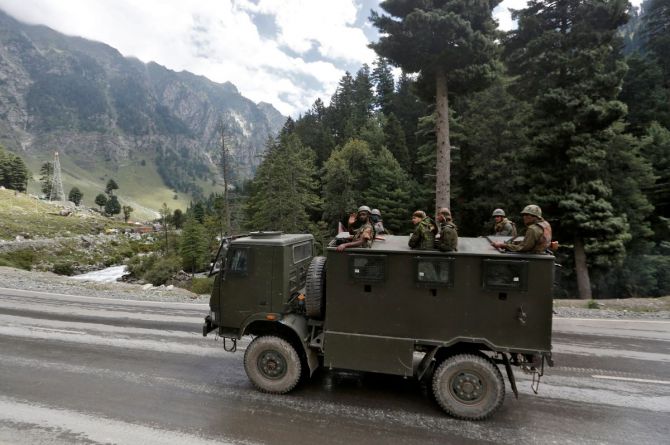
At the time of the Chinese infiltration in the Sumdorong Chu Valley in 1985-1986, the media and sections of the Opposition behaved responsibly.
No one sought to embarrass the government on the Chinese infiltration as Rahul Gandhi now does daily.
His pow-wow with the Chinese ambassador amidst the 2017 Doklam standoff was most controversial, especially when he failed to take the government into confidence.
Sharad Pawar's comment that the Opposition exercises utmost restraint discussing national security, and trusts the government to do the best thing in concert with the security experts in these matters did not prevent Rahul from parroting 'What about our land China has taken...'
Let us leave Rahul Gandhi alone. The current stand-off is fraught.
A negotiated pullout by the Chinese will be a setback for Chinese Communist Party General Secretary Xi Jinping ahead of the CCP's annual October congress.
Xi cannot go to the congress with a failed adventure at the Indian border.
His choice is clear. Either he emerges from the confrontation without losing face or the rival armies remain locked dangerously in combat positions in October-November and thus prepare for the long and harsh winter ahead.
The third option is a shooting war.
Which, by all accounts, both sides are keen to avoid. But given the red-hot tensions, a little misstep, a misunderstanding about what may be innocuous troop movement, can flare up into a deadly war.
Hopefully, wisdom will prevail.
War with the lethal arsenal of death on both sides should not be even the option of last resort.
Since the mid-1980s, India has developed its border infrastructure, its military is in much better shape to meet the Chinese challenge.
Of course, China is a much bigger economic and military power, but localised border warfare entails comparative strengths of the fighting troops.
Indians are better acclimatised in mountain warfare.
Besides, the morale of the Indian troops is high, particularly that they are engaged in vacating an aggression while the ordinary Chinese soldier is unclear as to the reason why he is made to put his life in jeopardy.
Also, as the Galwan clash testified, in hand-to-hand combat Indians are better placed to take full measure of the PLA troops.
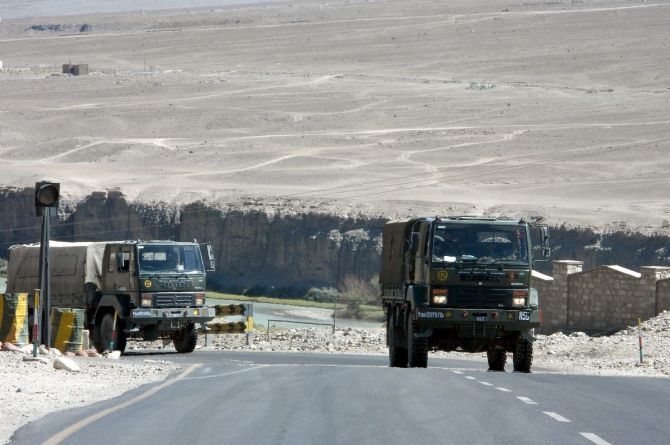
Of course, it does not have to necessarily come to a real shooting war.
But to avoid that chance flare-up, it is for China to move back and restore the status quo ante as existed in early April.
Otherwise, the rival troops will stand in complete readiness, arrayed against each other in close proximity.
India will not, cannot, pull back from its forward positions unless it can first verify the Chinese disengagement.
The next commanders meeting is unlikely to yield an agreement.
The situation has got to a point that without the intervention of the top political leadership in the two countries it is hard to see a mutual settlement.
How Xi Jinping will withdraw the aggression and justify it to his Communist party in case of a negotiated settlement might be his biggest headache.
Unless he is ready to gamble on an armed conflict, whose outcome given India's battle-readiness and determination is always uncertain.
He is in an unenviable position.
Feature Presentation: Aslam Hunani/Rediff.com


